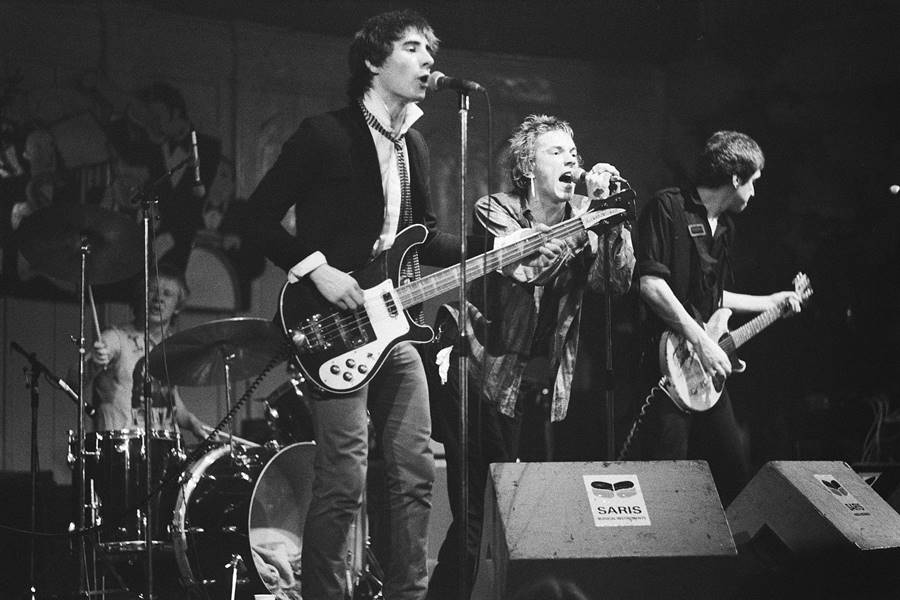
By Jae-Ha Kim
Chicago Sun-Times
August 11, 1996
Scholars and artists may argue about punk’s origin, but few will disagree that until the Sex Pistols exploded onto the music scene in 1976, not many people paid attention.
“The Sex Pistols were created by Malcolm McLaren, who was in the fashion business, so a look was pushed on them more so than on the American punks,” said James Stark, author of Punk ’77 (Stark Grafix). “That definitely made them more marketable.
“As big of an impact as they made, though, it’s incorrect to say punk began with the Pistols. They might have popularized it, but punk began on New York’s Lower East Side and the Bowery district around 1974 and 1975, and it was paralleled in San Francisco and Los Angeles. The Pistols were an extension of what the New York Dolls had been doing all along (since 1972).”
Even at its peak, the Sex Pistols wasn’t the kind of band that received mainstream airplay. Today, however, you can’t turn on the radio without hearing groups that obviously were influenced by the Pistols. Nirvana, Green Day, Rancid, the Offspring and the Smashing Pumpkins all share the same snarly attitude that made the Pistols such a scary band in the 1970s.
“Punk was something everyone thought was temporary,” Stark said. “So many people thought it would just fade away. But it hasn’t.”
According to the New Musical Encyclopedia of Rock Music, the term “punk rock” had been kicking around for more than a decade before the Pistols’ birth. The phrase was coined in the mid-1960s to describe the music of such groups as the Kingsmen, Shadows of the Knight and the Electric Prunes, artists not associated with today’s punk standards. Others view Iggy Pop (ca. 1969) as punk’s crown prince. And even John Lennon once claimed that the Beatles’ 1970 song “Polythene Pam” was rock’s first punk song.
But many credit the Ramones with spearheading the punk movement. With their feverish playing, ripped jeans, leather jackets and thick New York accents, the Ramones had a profound influence on the English punks. The Ramones had a Top 40 U.K. hit with 1977’s “Sheena is a Punk Rocker,” three years after they came together as a group.
In his book And God Created Punk (Virgin), author Mark Perry recalled thinking that the Ramones were “the fastest, loudest, most exciting music I’d ever heard.” The young Englishman was enthralled enough by their sound to start a punk fanzine, Sniffin’ Glue, in 1976. The name is nicked from the Ramones’ song “Now I Wanna Sniff Some Glue.”
And if nothing else, punk created the idea of just do it, long before Nike used it as a slogan.
“Before punk, you had maybe three or four venues in every city where the big groups would come and play during their tours,” said Stark. “But no-name bands that had maybe 20 fans had no place to play. What punk did was encourage more people to get out and start a band. And when that happened, small clubs started cropping up to accommodate these bands. Punk started this whole grass roots movement of do it yourself. Indie record companies began cropping up again – something that hadn’t been around in decades since the major labels took over – and it just gave the music business a big jolt.”
Punk rock also opened the doors for a wave of new music forms. A softer, more synth-oriented version of punk called new wave was a hit with the mainstream in the late 1970s and early 1980s, launching the careers of former punks Blondie and Devo.
“Kids have always shown definite signs of youth rebellion through their music,” Stark said. “In the mid-1950s, it was Elvis Presley and rock ‘n’ roll. In the ’60s, you had the psychedelic hippie movement. In the ’70s, you had punk. But since then, there hasn’t really been that definite youth rebellion from what went on before.”
What about alternative rock in the late 1980s and 1990s?
“Alternative is just watered-down punk with another name.”
But as rock splinters off into more music genres, many artists shun the categories. The Pistols now refer to themselves as a rock band. And the San Francisco trio Green Day blanches when it’s attributed as the leaders of the so-called punk revival.
“We’re not responsible for reviving anything,” said Green Day’s Mike Dirnt. “Punk has been here ever since and still goes on in small factions everywhere. But the only people who know about it are the ones who go to it. We never really went around saying, `We’re a punk band.’ We’re a rock ‘n’ roll band. There’s nothing punk about arenas. The music is the most important thing – not what it’s being called.”
So what is punk rock?
“Punk is you and me talking,” former Minutemen bassist Mike Watt said in an online Internet chat. “It’s communication.”